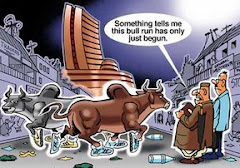 Analysts predict that U.S. stocks will fall further, in the trading week beginning tomorrow, on credit woes - this is bad news for Asian markets.
Analysts predict that U.S. stocks will fall further, in the trading week beginning tomorrow, on credit woes - this is bad news for Asian markets.Friday sell-off leaves investors hoping Fed will come to market's rescue
U.S. stocks are expected to fall in the trading weekbeginning tomorrow, continuing a broad sell-off seen on Friday, as investors stay on high-alert for more bad news linked to dodgy home loans, credit woes, and their potential impact on the broad economy, US analysts have said.
"My expectations are that equities are in for another volatile week," said Mike Malone, trading analyst at Cowen & Co. "It's going to be difficult for equities to sustain any gains until the concerns in the credit markets begin to wane."
Investors will also anxiously await the meeting of the Federal Reserve on Tuesday to see whether central bankers signal growing concerns about credit markets.
Friday sell-off:
Stocks again sold off on Friday, and finished the week sharply lower, after a weak July jobs report and news that Standard & Poor's downgraded Bear Stearns' credit outlook to negative, citing the impact of bad home loans on some of its funds.
The Dow Jones Industrial Average plunged 281 points, or 2%, to finish Friday at 13,181. The move left the blue-chip average down 0.7% on the week.
But most of the pain was seen in the broad market, which is heavily influenced by financial shares. The S&P 500 index plunged 39 points, or 2.7%, to 1,433 on Friday, for weekly loss of 1.8%. The Nasdaq Composite slid 64 points, or 2.5%, Friday to finish the week 1.9% lower.
This was the second week in a row that markets posted steep losses, as investors have become engulfed by fear about the availability of credit.
Bad U.S. home loans have turned into hefty losses for a number of hedge funds and banks around the world, while it has become much harder to raise money to finance leveraged buy-outs and share buybacks.
"We can expect ongoing tape bombs from various companies having various credit market problems," said Mike Englund, chief economist at Action Economics.
Besides Bear Stearns, which dipped 6.3% on Friday, brokers such as Goldman Sachs, Lehman Brothers and Merrill Lynch, along with many mortgage lenders and banks, have fallen steeply and are expected to continue to weigh heavily on the market.
In addition, "there's still a lot of questions about who's still trying to raise debt to boost dividends and finance share buybacks," said Paul Nolte, director of investments at Hinsdale Associates. "Home Depot is still having problems placing its debt [for its share buyback]."
Fed to the rescue?
The Fed is widely expected to leave interest rates unchanged on Tuesday but its statement will be studied carefully for any clues that central bankers are either edging closer to cutting interest rates, or would consider some type of intervention to prevent a credit crunch.
"Investors will certainly be looking to see what they have to say about the conditions in the credit markets," Cowen's Malone said. "But it's not certain what effect that will have on markets, even in the event that they do address those concerns."
In several speeches recently, Fed officials have indicated that they would not intervene to calm credit markets.
Ever since the Fed organized the 1998 bail-out of Long-Term Capital Management (LTCM), a hedge fund that failed after making the wrong bets before the Russian debt crisis, investors have come to rely on the U.S. central bank's willingness to intervene in times of crises. This reliance on the Fed has been dubbed the "Greenspan put", a reference to then-Fed-Chief Alan Greenspan.
But new Fed Chairman Ben Bernanke still has to earn his inflation-fighting credentials, "and might hold off longer before either signaling any rate cuts or some kind of intervention," said Ben Pace, chief investment officer at Deutsche Bank Private Wealth Management.











